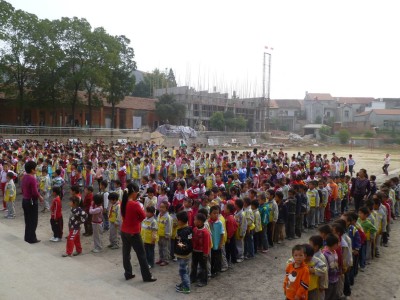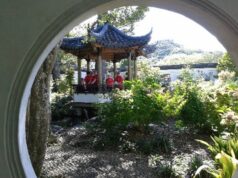 The National Executive of NZCFS is pursuing the opportunity to repeat this successful activity (see article by tour leader Jenevere Foreman) which was initiated by Mme Li Xiaolin, President of the Chinese People’s Association for Friendship with Foreign Countries (CPAFFC), to enable over-60 people to ‘teach’ in China. This report gives some personal insights into the education experience from delegation member John Meyer.
The National Executive of NZCFS is pursuing the opportunity to repeat this successful activity (see article by tour leader Jenevere Foreman) which was initiated by Mme Li Xiaolin, President of the Chinese People’s Association for Friendship with Foreign Countries (CPAFFC), to enable over-60 people to ‘teach’ in China. This report gives some personal insights into the education experience from delegation member John Meyer.
I was privileged to be given the opportunity to participate in a VIC Tour teaching programme in Hong’an County, Hubei Province, China for two weeks, followed by touring and visiting scenic sites. The forward thinking and building of relationsbetween NZCFS, and so with some aspects of New Zealand society, is to be warmly commended. On a personal level and within the exchange group, this was much appreciated. If this were a pathfinder programme there is the opportunity to build on and further develop the structures supporting it in the future, in order to maximise the benefits to the schools and the teachers and pupils involved.
From the limitations of the short period and the small range of schools which we attended, the following is a broad, very generalised summary of the education system in the schools we visited as I saw it. In many cases it opens up more questions than it provides answers for.
Chinese Education System – a summary
Education is much more “mass produced” in China because of the student numbers and the range of cultural differences throughout China, with progress subject to examination. So each class had a range of chronological ages reflecting this exam-promotion policy. There seemed to be a variation between either mid-term and final exam each term, or exams set on a monthly basis. I wasn’t able to ascertain whether each grade has the same exam set school-wide and text-book related. Also to what extent and at what level(s) there were any National check-point exams. Because of the marking load we saw examples of pupils assisting in the process, which may be because of the nature of the answers required.
Education seems to be much more widely appreciated than in New Zealand. There is a compulsory core examination curriculum of maths, chemistry, politics, geography, Mandarin, English, physics, history and biology, with music, art and sports/PE non examination subjects.
While there are variations within the educational system, there seem to be two semesters per year in the primary/middle school system, from February to June (Spring semester) and September to January (Autumn semester), with a total of approximately 5 months per semester. There are variations in the times of the school day which are dependent on the semester, to accommodate the very hot conditions in the middle of the day in the summer. In the cooler semester, there is a shortened lunch period. In the so-called Spring semester, the school day starts with a “pre-school” programme, with the morning school proper then running from about 8 a.m. till noon and pupils having lunch to approximately 2 p.m. Afternoon school then runs from 2 p.m. to 5 p.m. and for the senior classes there can then be a further hour’s study after the evening meal. There are some variations in these times between different schools.
Quite a number of the pupils, both boys and girls, board in the establishment, with school finishing midday on Friday to enable them to return home for the weekend. Local pupils go home for lunch or buy a meal off street vendors, and similarly at the end of the afternoon school. Additionally, quite a number of staff members live adjacent to the school buildings. Very few staff have cars, with some having scooters (often electric).
Although there is a one-child-per-family policy, from the limited examples we saw many pupils in the rural and smaller urban areas seem to have brothers and sisters but whether this is due to terminology differences would require further study
[Editor’s note: Rural and ethnic minority parents can have more than one child. Also, in urban areas, if both parents are themselves ‘single’ children, they can have a second child, and, if they already have one girl, they can try for a second child.]One young Chinese woman called me “grandfather”, which I am, but not hers. I was quite happy to answer to this as some of the terms reflect the age-cultural structure of the society, although this is changing with modern technology and similar. Teachers’ families are easily monitored to conform to the one-child policy.
Class Sizes
Classes vary considerably in size, over a hundred Grade 9 pupils being the largest I was involved with. Newly qualified teachers seem to have smaller classes. The informal survey of the system that I was able to do indicated that most classes reflect the demographic by having more boys (sometimes considerably so) than girls.
Teaching Methods & Support
While schools are obviously different from those in New Zealand, one similarity, from the sample we visited, was the further up the educational level the more broad-based the support for it appeared to be. While some of the larger classes had a microphone head-set to enable the teacher to communicate more clearly, there didn’t seem to be very much AV equipment and limited wall displays.
There is a series of textbooks of carefully graded progressive lessons, in much the same way as Mandarin texts teaching their language to us have the topic vocabulary and associated grammar.
Learning seems to be by rote-repetition in the main. We only saw one teacher teaching – a critique lesson for her appraisal, which she did in a very well prepared, step-by-step progression.
There seems to be a variation in the quality of the teachers’ spoken English, which might reflect the location of the schools (rural or small urban), the teacher’s training in the English language, and, with the younger teachers, could reflect the benefits of the increased emphasis given to English in the course they came through as students in the system. I took some basic speech training with some of the classes and this needs to be included in the teaching process.
However, I have only admiration for the way in which the teachers overall are addressing the teaching of English, and am very pleased to see the place English has in the school curriculum.
Personal Notes
As an aside, we did make a list of suggestions for personal toiletries, perhaps not routinely provided, and also a list of suggestions for some of the types of educational support, albeit some of only a minor nature, both of which lists we passed to Jenevere
On a personal level, although I have been to China a number of times I haven’t had the individual and institution-based contacts that the other two members of the group have had, having been only in tour groups on previous visits. These visits had been organised through Kunming Botanic Institute with Pukeiti Rhododendron Trust; New Plymouth and Kunming being sister cities.
The important part that history, trade, religion, culture and peoples have played in China’s past and shaping the present was brought much more to my notice. The pace of change and progress in the development of infrastructure in areas such as construction, industry, transport and urbanisation is so massive and widespread that it is difficult for us to grasp, both its intensity and its world-shaping importance.

I am very grateful for having had the opportunity through the invitation extended to us by Hubei to participate in this programme, and see the friendliness of the Chinese people to us. Special thanks to those at the Li Xiannian Home base for their kindness and friendliness in welcoming and hosting us initially, and to the hierarchy and staff of the schools we attended and for their patience with us, and to those who drove us on our scheduled programme. This hosting and courtesy was continued through the Hubei Province, Hong’an County, Hubei Foreign Affairs Office liaison overseeing the arranged touring which we did in the final period of our stay.
My personal thanks to those who, in one way or another, contributed to making our stay a very friendly, interesting and worthwhile time, including the well chosen trips and visits. My thanks also to the others in our group for a supportive and congenial time.
John Meyer
May, 2012




